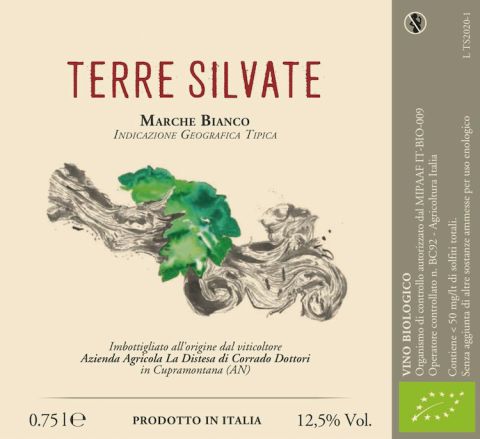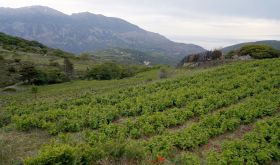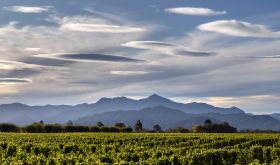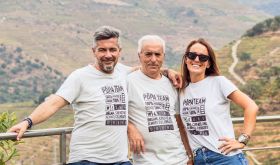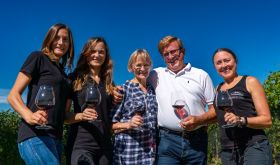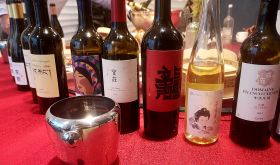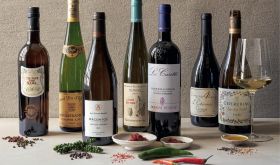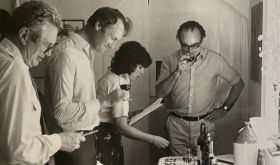From €14.50, $19.99 (2020), £22
First impression: on the wild side. Second impression: pure, textured, complex and incredibly versatile.
I came across this pale gold, ever-so-slightly cloudy wine in London's Toklas restaurant and it was immediately obvious why it had been chosen for pouring by the glass. It was a great match for a wide range of small dishes, including Toklas bakery's excellent meal-in-itself sourdough bread and butter; black figs with coco beans and frisée; mozzarella with romanesco, olives and pine kernels; and frigitelli peppers (like Padrón peppers but without the unexpected hot one in ten). The only flavours it didn't cope with were those of the boquerones, which were doused in fabulous (regeneratively farmed) Two Fields olive oil and scattered with dill.
Terre Silvate is made from Verdicchio grapes with around 10% Trebbiano (both Trebbiano Toscano, aka Procanico, and Trebbiano Romagnolo, aka Biancame, because they are interplanted in the vineyard and harvested and fermented together) from five different organically farmed vineyards in the hills around Cupramontana, four in Cupramontana itself and one in nearby San Paolo di Jesi, all in the province of Ancona in the Marche region of east-central Italy, about 35 km (22 miles) south-west of the city of Ancona on the Adriatic coast. Verdicchio is the variety of the region but can be used to produce many different styles of wine. The Distesa vineyards range in elevation from 250 to 450 m (820–1,480 ft), the slopes facing in various different directions, giving more or less ripe fruit flavours, and the soils vary from clay with limestone to clay with more sandstone.
As well as working organically, they apply some biodynamic preparations and eschew many practices common in the vineyards: trimming, leaf removal, applying fertiliser. Importantly, the estate is not a monoculture because it incorporates 'woods, hedges, trees, reeds, grass alternating with arable crops … olive groves (that are never treated) and vineyards. We view agriculture as a living ecosystem, balanced between the energy of the wild and the force of man', say the team at La Distesa.
About 15% of the grapes spend five or six days on the skins, which is what gives the wine its firm, food-friendly texture and real substance in a wine of 13% alcohol. The juice is fermented in large concrete tanks and spends about six months on the lees, once again adding to the texture and body of the wine. No oak trees were involved in the production of this wine that constantly reveals different facets of its personality.
It's made in La Distesa's cellar in the hamlet of San Michele, where vineyards were recorded as far back as 1471. The vineyards that today constitute the estate, planted in the interests of biodiversity with a wide range of cover crops among the vines (sown fava, vetch, peas, alfalfa as well as wild plants), have been in the Dottori family since 1935, when they were bought by Domenico Dottori, grandfather of the current incumbent Corrado Dottore. The recent history of the estate, and how it came into Corrado's hands in the late 1990s, is described so evocatively by Corrado himself that I prefer to focus on my experience of the deliciously complex wine.
The aromas are hard to describe, not least because they change in the glass and because words can be so easily misinterpreted or mean different things to different people, but I detected both fruits and flowers: sour and ripe apples, dried grasses, cedar and just-ripe apricots. Although this description might suggest a slightly funky or oxidised wine, this impression is contradicted by the clarity and cleanness of flavours in the mouth: still cedary apples but held together in a bright, pure freshness. I urge wine lovers with strong feelings for and against natural wines to drink and debate this thoughtfully grown and vinified white.
Dottori describes the winemaker as a tightrope walker who loves taking risks, but who minimises risks by the work in the vineyard: 'The better, the healthier and more natural the grapes are when brought to the cellar, the more the risks are kept under control.' This wine definitely walks a tightrope but it maintains exceptional balance.
The wine is imported into the UK by Tutto, who kindly provided the vineyard photo above. Terre Silvate is available directly from them and is, or has been, on many an enlightened restaurant wine list in the UK. It is also sold in London by, among others, Noble Fine Liquor, Shrine to the Vine, Dina Wines and Lina Stores; and outside London by, for example, Bottega Caruso in Margate and Landrace Bakery in Bath.
La Distesa's US importer Louis Dressner are currently listing the 2020 (which is what you can find for the US on Wine-Searcher at the moment) but confirm that they will be moving on to the 2021 in a couple of weeks. I have not tasted the 2020 but am assured by those who have that this wine ages well for up to five years. In addition to the stockists listed on Wine-Searcher for the 2020, they give the following examples of other stockists who are very likely to be listing the 2021:
- Brooklyn and NY: Vine Wine, Forêt Wines, Heights Chateau, Kingston Wine Co upstate, Dry Dock, Starr Wines
- Oregon: E & R Wine Shop
- California: Domaine LA, Helen’s Wines, Biondivino, Flatiron
- Chicago: Red & White, Anfora
For more about La Distesa, see part 5 of Walter's Verdicchio series, written in 2012 and revealing Corrado's deep interest in the identification of the region's best vineyards and describing several vintages of Gli Eremi, Corrado Dottori's single-vineyard Verdicchio.



